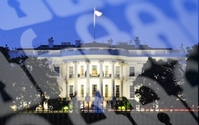White House Readies Bill Establishing New Privacy Rights
- by Wendy Davis @wendyndavis, January 12, 2015

The White House will unveil its long-awaited privacy “bill of rights” by the end of February, President Obama said on Monday.
The anticipated measure will set out “basic baseline protections across industries,” Obama said. He signaled that the bill will limit companies' ability to collect data from consumers without their consent. The measure also appears likely to include prohibitions against collecting data for one purpose and then using it for different ones.
The administration first floated the idea of a privacy bill of rights in 2012, but didn't propose specific legislation at the time.
Obama announced the upcoming bill in a speech delivered on Monday at the Federal Trade Commission, where he also said the administration will introduce the Student Digital Privacy Act, which will prevent marketers from using students' data for advertising. “Data collected on students in the classroom should only be used for educational purposes, to teach our children, not to market to our children,” Obama said.
advertisement
advertisement
Seventy-five companies, including Apple and Microsoft, have already promised to follow a student-privacy “pledge” developed by the think tank Future of Privacy Forum and Software & Information Industry Association. That code prohibits companies from selling data about students and from sending them behaviorally targeted ads.
The White House also plans to back a comprehensive data-breach notification bill, which would require companies to notify consumers within 30 days of a security breach. Obama is expected to mention all of those privacy-related measures in next week's State of the Union address.
Justin Brookman, head of the Center for Democracy and Technology's consumer privacy unit, said he was glad the White House is moving forward with the privacy bill of rights. “We were first told it was coming in February of 2012,” he said, adding that privacy advocates have been pushing for legislation since then. “I'm gratified to see a clear timetable.”
At the same time, Brookman acknowledged that moving a bill through the Republican-controlled Congress could prove challenging. But he also said that a bill could provide a blueprint for the types of practices that advocates think should be implemented, depending on how the measure is worded.
Jules Polonetsky, executive director and co-chair of the Future of Privacy Forum, adds that the White House's move shows that privacy is “a major focus” of the administration — especially given that Obama is expected to reiterate calls for legislation as part of his State of the Union address.
He adds that many businesses have shown a recent uptick in self-regulatory activity on privacy issues. For instance, last November the car industry adopted a privacy code that prohibits manufacturers from providing geolocations for automobiles to marketers without drivers' opt-in consent. Last February, a group of mobile analytics companies agreed to follow a privacy code that requires them to let smartphone users opt out of location tracking for analytics purposes.
Some privacy advocates appeared skeptical about whether a new “bill of rights” will have much effect on companies that collect data. “While the 'Bill of Rights' incorporates high-minded principles, we fear that at the end of the day, legislation will sanction our ever-growing data collection status quo,” Jeff Chester, executive director of the Center for Digital Democracy, stated.


